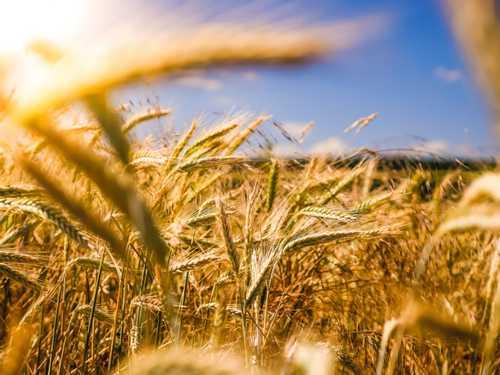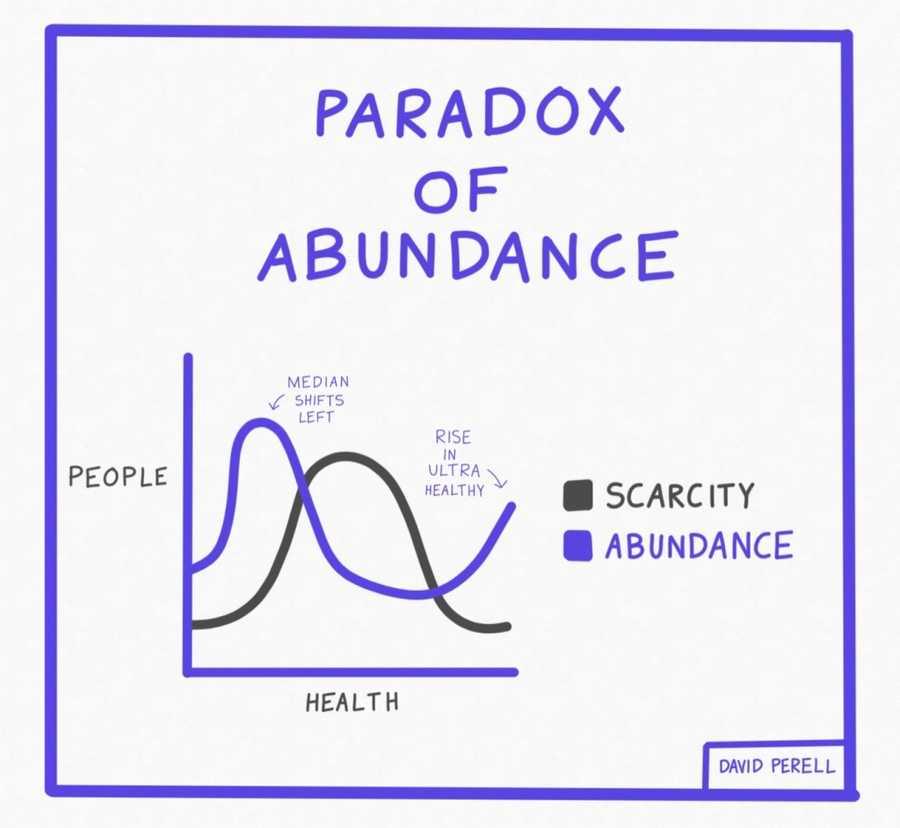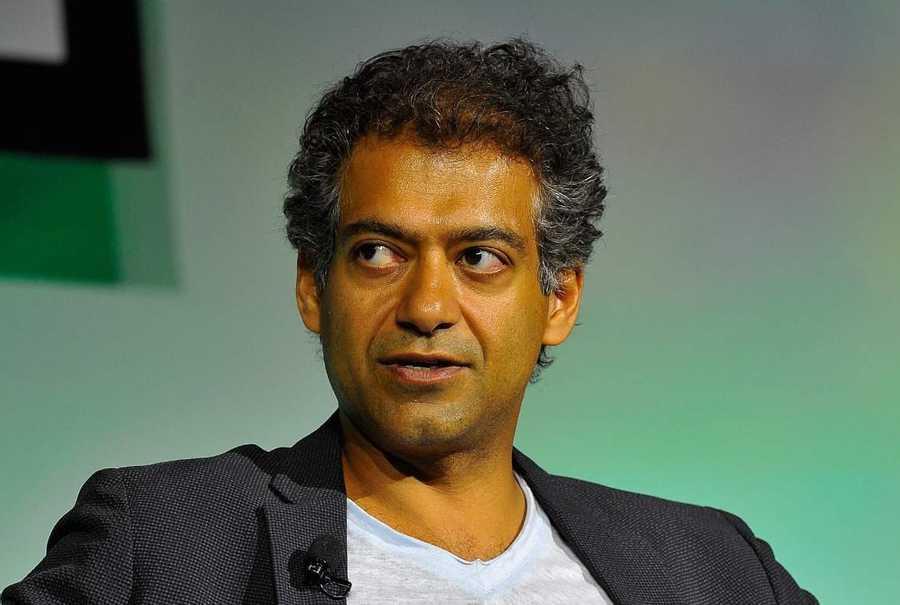The Paradox of Abundance - David Perell
Curated from: perell.com
Ideas, facts & insights covering these topics:
10 ideas
·706 reads
12
1
Explore the World's Best Ideas
Join today and uncover 100+ curated journeys from 50+ topics. Unlock access to our mobile app with extensive features.
Abundance: Both Good And Bad
Abundance is a paradox. Environments of abundance are bad for the median consumer but extremely good for a small number of conscious ones. Average consumers are doomed to the tyranny of instinct. Meanwhile, consumers at the top are propelled by unlimited access to nutritious food and information.
The best metaphor is health, where obesity rates and the number of people in incredible shape are both rising. That’s why 71% of American adults are obese, while the people I see at Equinox in Manhattan have bodies that are as sculpted as a Greek statue.
12
152 reads
Two Worlds At The Same Time
- Americans are overweight, not because of scarcity but because of abundance — just like the news.
- At the same time, wealthy and health-conscious Americans have never been in better physical shape.
The healthiest people control their diet with surgical precision. They have access to state-of-the-art workout facilities, wearable health technology, and fresh foods to match their dietary goals. They walk with six-pack abs and arms like the Incredible Hulk, while they walk with the can’t-lose swagger of Connor McGregor at a UFC fight.
11
107 reads
Food Is Like News
News and food consumption are near-perfect metaphors.
We already use terms like “food for thought,” “I need to digest an idea,” and “she has a thirst for knowledge.” This is also why writing is so healthy for the mind. Just as you’ll improve your food diet if you start cooking, you’ll improve your information diet if you start writing.
Just as eating healthy is an everyday battle, the Internet makes it hard to find nutrient-dense information. It’s absolutely possible, but it demands deliberate effort. The Internet increases variance in outcomes. More good and more bad.
12
70 reads
Gresham’s Law
Gresham’s Law is a finance concept that states that bad money drives out good money until only bad money is left.
This law can explain why the median consumer reads low-quality information online. On the Internet, low-quality content drives out high-quality content, as the most wide-read articles are polarizing and emotionally jarring. First, they distort the truth by eliminating nuance and adding emotional charge to important topics. If you check almost any major publication, the most popular stories are opinionated and fear-inducing, drawing readers in.
12
72 reads
The Ocean Named Twitter
The Explore Tab on Twitter is the most important newspaper in the world. It’s littered with celebrity gossip and exaggerated political drama — both of which yield a wide reach but incentivize empty content.
And yet, as the Paradox of Abundance predicts, Twitter is also one of the world’s top intellectual communities. It’s the bedrock of most of our social and intellectual life. It’s a place to make friends, raise your ambitions, and connect directly with people at the top of their fields. And yet, most people use Twitter to consume information with no nutritional value.
13
42 reads
Theory Vs Practicals
Ideally, a world of information abundance would bring the best to the top. Using a classic Econ 101 argument, competition should benefit consumers by improving quality.
Practically, curation platforms would wade through millions of posts every day and highlight the best of the best. But that’s not what happens.
On most platforms, low-nutrition content is the easiest to find and the most likely to be consumed.
Superficial article recommendations sit at the bottom of thousands of articles, pollute the Internet, and tarnish the credibility of media publications.
11
49 reads
Less News
As a society, we can spend less energy following the news and become more informed about our society. The act of reading the news carries symbolic weight.
People in power won’t fear the pain of a journalist’s bite unless the news maintains its legitimacy. Likewise, even if reading the news isn’t an efficient way to learn about the world, the news industrial complex might be a necessary inefficiency in society.
11
59 reads
Make Your Own Way
Skip the news cycle, but double down on measured consumption. Ignore society’s recommendations for what to consume and refresh your learning habits like you’re shaking an etch-a-sketch.
Remember, what you should consume looks nothing like what you were taught to consume. Rebel against the mainstream spotlight, find some trusted curators and chart your own path instead.
12
44 reads
If you diet, invest, and think according to what the ‘news’ advocates, you’ll end up nutritionally, financially, and morally bankrupt.
NAVAL RAVIKANT
13
72 reads
The Minefield Of The Internet
The modern media environment helps a small number of savvy consumers, just as it destroys the lives of millions of mindless consumers who are paralyzed by fear, anger, and misinformation. Careful consumers use the information at their fingertips to compound their wisdom while compulsive ones drown in a volcano of fire-burning rage.
On the Internet, your rate of learning is limited not by access to information, but by your ability to ignore distractions. The people you follow online is a leading indicator of your success, your health, and your happiness.
14
39 reads
IDEAS CURATED BY
George I.'s ideas are part of this journey:
Learn more about psychology with this collection
How to establish a positive team culture
How to collaborate effectively
How to build trust with a new team
Related collections
Similar ideas
16 ideas
The Plant Paradox Summary
fourminutebooks.com
5 ideas
One Big Idea
perell.com
6 ideas
Expression is Compression - David Perell
perell.com
Read & Learn
20x Faster
without
deepstash
with
deepstash
with
deepstash
Personalized microlearning
—
100+ Learning Journeys
—
Access to 200,000+ ideas
—
Access to the mobile app
—
Unlimited idea saving
—
—
Unlimited history
—
—
Unlimited listening to ideas
—
—
Downloading & offline access
—
—
Supercharge your mind with one idea per day
Enter your email and spend 1 minute every day to learn something new.
I agree to receive email updates


